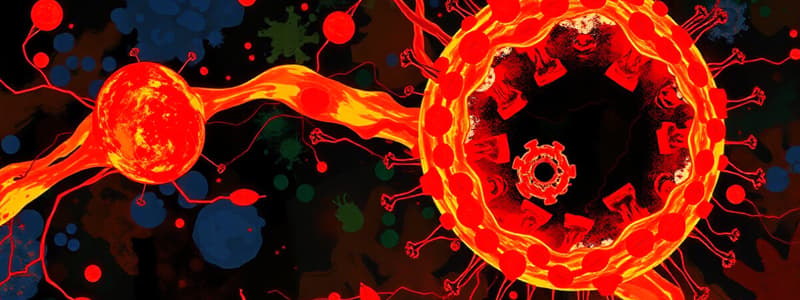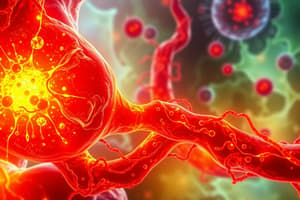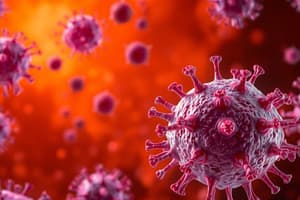Podcast
Questions and Answers
What is the primary role of leukocytes in inflammation?
What is the primary role of leukocytes in inflammation?
- To release histamines
- To fight infection (correct)
- To promote tissue repair
- To facilitate communication between cells
What characterizes acute inflammation?
What characterizes acute inflammation?
- Prolonged response to infection
- Long-term tissue damage
- Redness, heat, swelling, and pain (correct)
- Increased susceptibility to infections
Which mediators are key to promoting inflammation and pain?
Which mediators are key to promoting inflammation and pain?
- Cytokines and prostaglandins (correct)
- Insulin and glucagon
- Fibroblasts and endothelial cells
- Adrenaline and cortisol
What is the effect of chronic stress on inflammation?
What is the effect of chronic stress on inflammation?
What process describes the migration of leukocytes to the injury site during inflammation?
What process describes the migration of leukocytes to the injury site during inflammation?
Which part of the nervous system is primarily activated during acute stress?
Which part of the nervous system is primarily activated during acute stress?
How does the Hypothalamic-Pituitary-Adrenal (HPA) Axis affect inflammation?
How does the Hypothalamic-Pituitary-Adrenal (HPA) Axis affect inflammation?
Which method is NOT typically used to manage inflammation associated with chronic stress?
Which method is NOT typically used to manage inflammation associated with chronic stress?
Study Notes
Inflammation
Immune Response
- Definition: Inflammation is a protective biological response to tissue injury or infection.
- Types of Inflammation:
- Acute: Short-term response, characterized by redness, heat, swelling, and pain.
- Chronic: Long-term inflammation, potentially leading to tissue damage and diseases.
- Key Components:
- Cells Involved:
- Leukocytes: White blood cells (e.g., neutrophils, macrophages) that play a crucial role in fighting infection.
- Mast Cells: Release histamines and other chemicals that promote inflammation.
- Mediators:
- Cytokines: Proteins that facilitate communication between cells during the immune response.
- Prostaglandins: Lipid compounds that promote inflammation and pain.
- Cells Involved:
- Stages of Inflammation:
- Vascular Response: Increased blood flow and permeability of blood vessels.
- Cellular Response: Migration of leukocytes to the site of injury or infection.
- Resolution: Clearance of pathogens and debris, followed by tissue repair.
Stress Response
- Definition: The body's response to stressors, which may include both physical and psychological factors.
- Types of Stress:
- Acute Stress: Short-term stress response that can trigger inflammation.
- Chronic Stress: Prolonged stress that can lead to persistent inflammation and health problems.
- Mechanisms:
- Hypothalamic-Pituitary-Adrenal (HPA) Axis: Activation leads to the release of cortisol, which can modulate inflammation.
- Sympathetic Nervous System: Releases adrenaline, increasing heart rate and blood flow, contributing to the inflammatory process.
- Effects of Chronic Stress on Inflammation:
- Increased levels of pro-inflammatory cytokines.
- Altered immune function, potentially leading to increased susceptibility to infections.
- Contributes to chronic diseases (e.g., cardiovascular disease, diabetes) through sustained inflammatory responses.
- Management:
- Stress reduction techniques (e.g., mindfulness, exercise) can help mitigate inflammation associated with chronic stress.
Inflammation
- Definition: A protective biological mechanism activated in response to tissue injury or infection.
- Types of Inflammation:
- Acute Inflammation: A rapid, short-term response characterized by redness, heat, swelling, and pain.
- Chronic Inflammation: A prolonged response that can result in tissue damage and underlying diseases.
Key Components of Inflammation
-
Cells Involved:
- Leukocytes: Essential white blood cells like neutrophils and macrophages that combat infection.
- Mast Cells: Responsible for releasing histamines and substances that promote inflammation.
-
Mediators:
- Cytokines: Proteins facilitating cell communication during immune responses.
- Prostaglandins: Lipid compounds that enhance inflammation and pain sensation.
-
Stages of Inflammation:
- Vascular Response: Involves increased blood flow and enhanced vessel permeability.
- Cellular Response: The migration of leukocytes occurs to the injury or infection site.
- Resolution: The clearance of pathogens and debris leading to tissue repair.
Stress Response
- Definition: The body’s reaction to stressors, encompassing physical and psychological factors.
- Types of Stress:
- Acute Stress: Short-lived stress that can provoke an inflammatory response.
- Chronic Stress: Long-lasting stress that may lead to continuous inflammation and various health issues.
Mechanisms of Stress Influence on Inflammation
- Hypothalamic-Pituitary-Adrenal (HPA) Axis: Its activation results in cortisol release, which influences inflammation regulation.
- Sympathetic Nervous System: Activation leads to adrenaline release, enhancing heart rate and blood flow, which contributes to inflammation.
Effects of Chronic Stress on Inflammation
- Increased levels of pro-inflammatory cytokines.
- Alterations in immune function, increasing vulnerability to infections.
- Association with chronic diseases, such as cardiovascular issues and diabetes, due to persistent inflammatory responses.
Management Strategies
- Stress reduction techniques, including mindfulness practices and regular exercise, may alleviate inflammation caused by chronic stress.
Studying That Suits You
Use AI to generate personalized quizzes and flashcards to suit your learning preferences.
Description
Explore the mechanisms of inflammation in the human body. This quiz covers the definitions, types, key components, and stages of the inflammatory response to injury and infection. Test your understanding of acute and chronic inflammation, and the roles of different immune cells.





